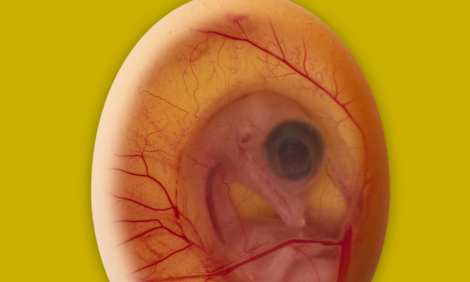



Some Poultry Vaccines Allow More Virulent Viruses to Evolve
US - Experiments with the virus causing Marek's disease in poultry seem to confirm the controversial theory that some vaccines could allow more virulent versions of a virus to survive, according to recent research published in PLoS Biology.This situation could be putting un-vaccinated individuals at greater risk of severe illness. The research has important implications for food-chain security and food-chain economics, as well as for other diseases that affect humans and agricultural animals.
"The challenge for the future is to identify other vaccines that also might allow more-virulent versions of a virus to survive and possibly to become even more harmful," said Andrew Read, an author of the paper describing the research. Mr Read is the Evan Pugh Professor of Biology and Entomology and Eberly Professor in Biotechnology at Penn State University.
"When a vaccine works perfectly, as do the childhood vaccines for smallpox, polio, mumps, rubella, and measles, it prevents vaccinated individuals from being sickened by the disease, and it also prevents them from transmitting the virus to others," Mr Read said.
These vaccines are a type that is "perfect" because they are designed to mimic the perfect immunity that humans naturally develop after having survived one of these diseases.
"Our research demonstrates that another vaccine type allows extremely virulent forms of a virus to survive - like the one for Marek's disease in poultry, against which the poultry industry is heavily reliant on vaccination for disease control," said Venugopal Nair, who led the research team in the United Kingdom where the experimental work related to this study was carried out.
Mr Nair is the head of the Avian Viral Diseases program at the Pirbright Institute, which also hosts the OIE Reference Laboratory on Marek's disease. "These vaccines also allow the virulent virus to continue evolving precisely because they allow the vaccinated individuals, and therefore themselves, to survive," Mr Nair said.
Less-than-perfect vaccines create a 'leaky' barrier against the virus, so vaccinated individuals sometimes do get sick, but typically with less-virulent symptoms. Because the vaccinated individuals survive long enough to transmit the virus to others, the virus also is able to survive and to spread throughout a population.
"In our tests of the leaky Marek's-disease virus in groups of vaccinated and unvaccinated chickens, the unvaccinated died while those that were vaccinated survived and transmitted the virus to other birds left in contact with them," Mr Nair said.
"Our research demonstrates that the use of leaky vaccines can promote the evolution of nastier 'hot' viral strains that put unvaccinated individuals at greater risk."
The theory tested by the research team was highly controversial when it first was proposed over a decade ago. The team's experiments now show, for the first time, that the modern leaky vaccines, widely used in the agricultural production of poultry, can have precisely the effect on evolution of more-virulent strains of the virus that the controversial theory predicted.
Marek's disease used to be a minor disease that did not do much harm to chickens in the 1950s, but the virulence of the virus has evolved and today it even is capable of killing all the unvaccinated birds in poultry flocks, sometimes within 10 days.
"Even though the Marek's disease virus is much nastier now than it was in the 1950s, it is becoming increasingly rare and now it causes relatively minor problems in the poultry industry because almost every chicken in agricultural production worldwide is vaccinated against the disease," Mr Read said.
"If you can vaccinate all the individuals in a population against a virus, it does not matter if the virus has become super virulent so long as the vaccine continues to be effective."
The virus for Marek's disease is very virulent, but the virus causing avian influenza can be even worse.
"The most-virulent strain of avian influenza now decimating poultry flocks worldwide can kill unvaccinated birds in just under three days," Mr Read said. The vaccine against avian influenza is a leaky vaccine, according to Mr Read.
"In the United States and Europe, the birds that get avian influenza are culled, so no further evolution of the virus is possible," Mr Read said.
"But instead of controlling the disease by culling infected birds, farmers in Southeast Asia use vaccines that leak - so evolution of the avian influenza virus toward greater virulence could happen."
The research has implications for human health, as well. The World Health Organisation recently reported laboratory-confirmed cases in China of human infection with the avian influenza virus, including a number of deaths.
"We humans never have experienced any contagious disease that kills as many unvaccinated hosts as these poultry viruses can, but we now are entering an era when we are starting to develop next-generation vaccines that are leaky because they are for diseases that do not do a good job of producing strong natural immunity - diseases like HIV and malaria," Mr Read said.
"Vaccines for human diseases are the least-expensive, most-effective public-health interventions we ever have had," Mr Read said.
"But the concern now is about the next-generation vaccines. If the next-generation vaccines are leaky, they could drive the evolution of more-virulent strains of the virus."
He said it is critical now to determine as quickly as possible that the Ebola vaccines that now are in clinical trials are not leaky - that they completely prevent the transmission of the Ebola virus among people.
"We do not want the evolution of viral diseases as deadly as Ebola evolving in the direction that our research has demonstrated is possible with less-than-perfect, leaky vaccines," Mr Read said.
The researchers recommend rigorous testing and vigilant monitoring of next-generation vaccines to prevent the runaway evolution of more-virulent strains of viruses that their research has confirmed can occur with leaky vaccines.
"If some day we have a malaria vaccine or an HIV vaccine, of course we should use those vaccines, but we would be in significant danger if those vaccines turned out to be leaky and we had not developed effective ways to eradicate any strains that might become more virulent," Mr Read said.
Mr Read also recommends vaccination for individual protection. "When evolution toward more-virulent virus strains takes place as a result of vaccination practices, it is the unvaccinated individuals who are at the greatest risk.
"Those who are not vaccinated will be exposed, without any protection, to the hottest strains of a virus. Our research provides strong evidence for the importance of getting vaccinated."








